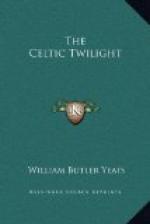to have feelings. There are points beyond which
neither will go. No Irish peasant would treat
a captured faery as did the man Campbell tells of.
He caught a kelpie, and tied her behind him on his
horse. She was fierce, but he kept her quiet by
driving an awl and a needle into her. They came
to a river, and she grew very restless, fearing to
cross the water. Again he drove the awl and needle
into her. She cried out, “Pierce me with
the awl, but keep that slender, hair-like slave (the
needle) out of me.” They came to an inn.
He turned the light of a lantern on her; immediately
she dropped down like a falling star, and changed
into a lump of jelly. She was dead. Nor would
they treat the faeries as one is treated in an old
Highland poem. A faery loved a little child who
used to cut turf at the side of a faery hill.
Every day the faery put out his hand from the hill
with an enchanted knife. The child used to cut
the turf with the knife. It did not take long,
the knife being charmed. Her brothers wondered
why she was done so quickly. At last they resolved
to watch, and find out who helped her. They saw
the small hand come out of the earth, and the little
child take from it the knife. When the turf was
all cut, they saw her make three taps on the ground
with the handle. The small hand came out of the
hill. Snatching the knife from the child, they
cut the hand off with a blow. The faery was never
again seen. He drew his bleeding arm into the
earth, thinking, as it is recorded, he had lost his
hand through the treachery of the child.
In Scotland you are too theological, too gloomy.
You have made even the Devil religious. “Where
do you live, good-wyf, and how is the minister?”
he said to the witch when he met her on the high-road,
as it came out in the trial. You have burnt all
the witches. In Ireland we have left them alone.
To be sure, the “loyal minority” knocked
out the eye of one with a cabbage-stump on the 31st
of March, 1711, in the town of Carrickfergus.
But then the “loyal minority” is half Scottish.
You have discovered the faeries to be pagan and wicked.
You would like to have them all up before the magistrate.
In Ireland warlike mortals have gone amongst them,
and helped them in their battles, and they in turn
have taught men great skill with herbs, and permitted
some few to hear their tunes. Carolan slept upon
a faery rath. Ever after their tunes ran in his
head, and made him the great musician he was.
In Scotland you have denounced them from the pulpit.
In Ireland they have been permitted by the priests
to consult them on the state of their souls.
Unhappily the priests have decided that they have no
souls, that they will dry up like so much bright vapour
at the last day; but more in sadness than in anger
they have said it. The Catholic religion likes
to keep on good terms with its neighbours.




